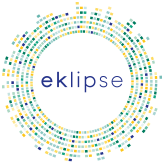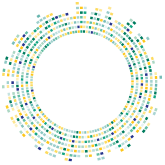The first milestone on the path to building Eklipse was the creation of the European Platform for Biodiversity Research Strategy (EPBRS) in 1999 — an open, informal forum between policy makers and scientists in the field of biodiversity. Its goal was to ensure research priorities would be more relevant for environmental policies. EPBRS gathered enthusiastic individuals and stimulated thinking around biodiversity science and policy for more than 15 years. It played the role of a think tank through numerous events and activities to encourage brainstorming and debates. EPBRS was supported by early European Union coordination actions, namely BIOPLATFORM (2001-2005) and BioSTRAT (2007-2009).
History
EPBRS: the first European Platform for Biodiversity Research Strategy

Building on the SPIRAL and KNEU projects
Two major projects in Science Policy Interfaces (SPIs) emerged in 2010 (both Seventh Framework Programme funded):
1- the SPIRAL project that advanced our understanding of SPIs and generated best practices on how to implement effective SPIs;
2- the KNEU project that explored how a network of networks on biodiversity could be set up and what its functions and processes to respond to policy needs would be.
In parallel, many other European Union (EU)-funded projects and networks, such as Alternet or BiodivERsA, were launched to promote science-policy activities.
Recent policy needs for better informed decision making
In 2013, the Seventh General Union Environment Action Programme (7th EAP) adopted, as one of its priority objectives, the aim of improving the knowledge and evidence base for environmental policy. It highlighted the importance of improving the science-policy interface and citizen engagement, and intensifying cooperation at all levels — international, European Union, and Member State. As a consequence, the Directorate-General for Environment (EC-DG ENV) supported a service contract “towards an EU mechanism interfacing science and policy on biodiversity and ecosystem services”.
The EKLIPSE project
The development of this mechanism was supported, between 2016 and 2020, by the EKLIPSE project, funded by the European Commission under the Horizon 2020 funding stream, and coordinated initially by the UK Centre for Ecology & Hydrology and then by the Helmholtz Centre for Environmental Research – UFZ. The EKLIPSE project was an unusual project as it was funded for four years to develop a sustainable mechanism that would be in place for many years to come. This was made possible thanks to project partners, whose role was to facilitate linkages between science, policy and society, through different actions, such as knowledge synthesis, identifying research priorities, and building the network of networks for supporting other actions.
A large part of the budget of the EKLIPSE project was made available to the wider community through open calls for requests. Our first request came from the European Commission and was on nature-based solutions in cities. Many other requests have since followed.
Another key part of the EKLIPSE project was its formative evaluation, which ensured timely feedback from everyone involved in and dealing with the processes handled by EKLIPSE. Throughout the project, it provided continual advice to ensure joint reflection and learning as well as the improvement of processes and adjustment of EKLIPSE’s governance structure. The developed formative evaluation guidelines and criteria are now used for the self-sustaining mechanism.
”Over 250 scientists and other knowledge holders have participated in these requests, ensuring that decision-makers have access to the most relevant knowledge available. In addition, by highlighting priority knowledge gaps, new avenues for research have been opened.
Allan WattFormer KCB chair, independent
”Together for better biodiversity policy, together for optimal science support.
Maurice HoffmannChair of Alternet Council, director of INBO
Eklipse & Alternet
The decision was made in 2019 that Alternet and its consortium partners would fully take over management of the EKLIPSE Mechanism, now rebranded as Eklipse, at the end of the EU-financed period of the project.
This means that one of the main objectives of the EKLIPSE project has been achieved, namely to develop a mechanism and to hand it over to the broader community. The outcome of this decision is the result of months of work and preparation by both teams to ensure a smooth transition of the mechanism. In 2021, the EKLIPSE project came to an end and left the place to the self-sustaining Eklipse Mechanism under the Alternet´s management .
The international non-profit organization Alternet is a network of European institutions that work on biodiversity and ecosystem services The purpose of Alternet is to provide sound scientific evidence to international, European, national and regional policymakers and businesses and people involved in improving the sustainable use, management, conservation and restoration of biodiversity, ecosystems, ecosystem services and social involvement, through the integration of European interdisciplinary research capacity, knowledge integration and communication. Eklipse fits ideally within Alternet as an activity with the specific aim to support decision making. The activities of Alternet are supported by the contributions of its partners. Currently, Alternet comprises 25 partner institutes from a total of 18 countries.



